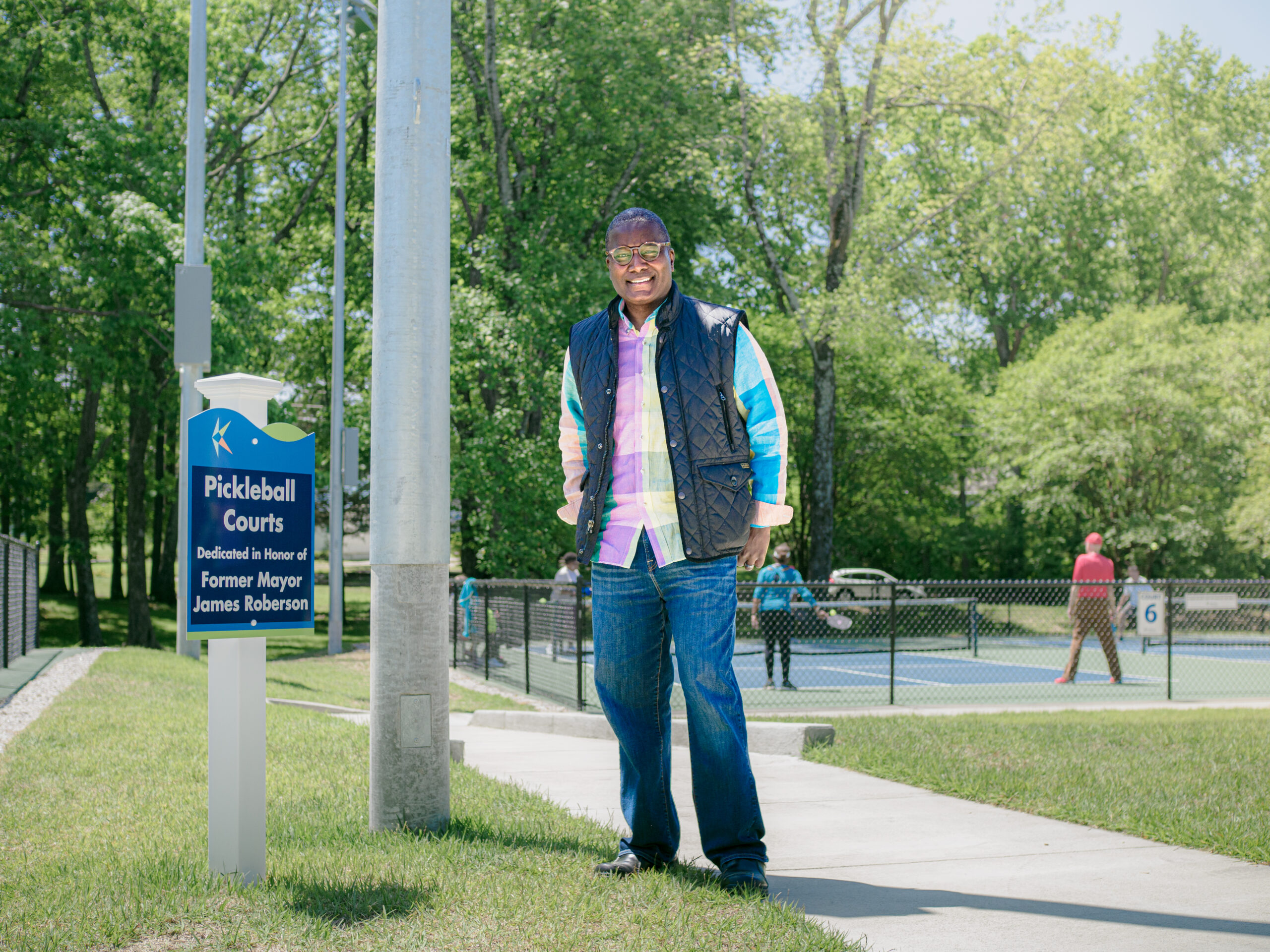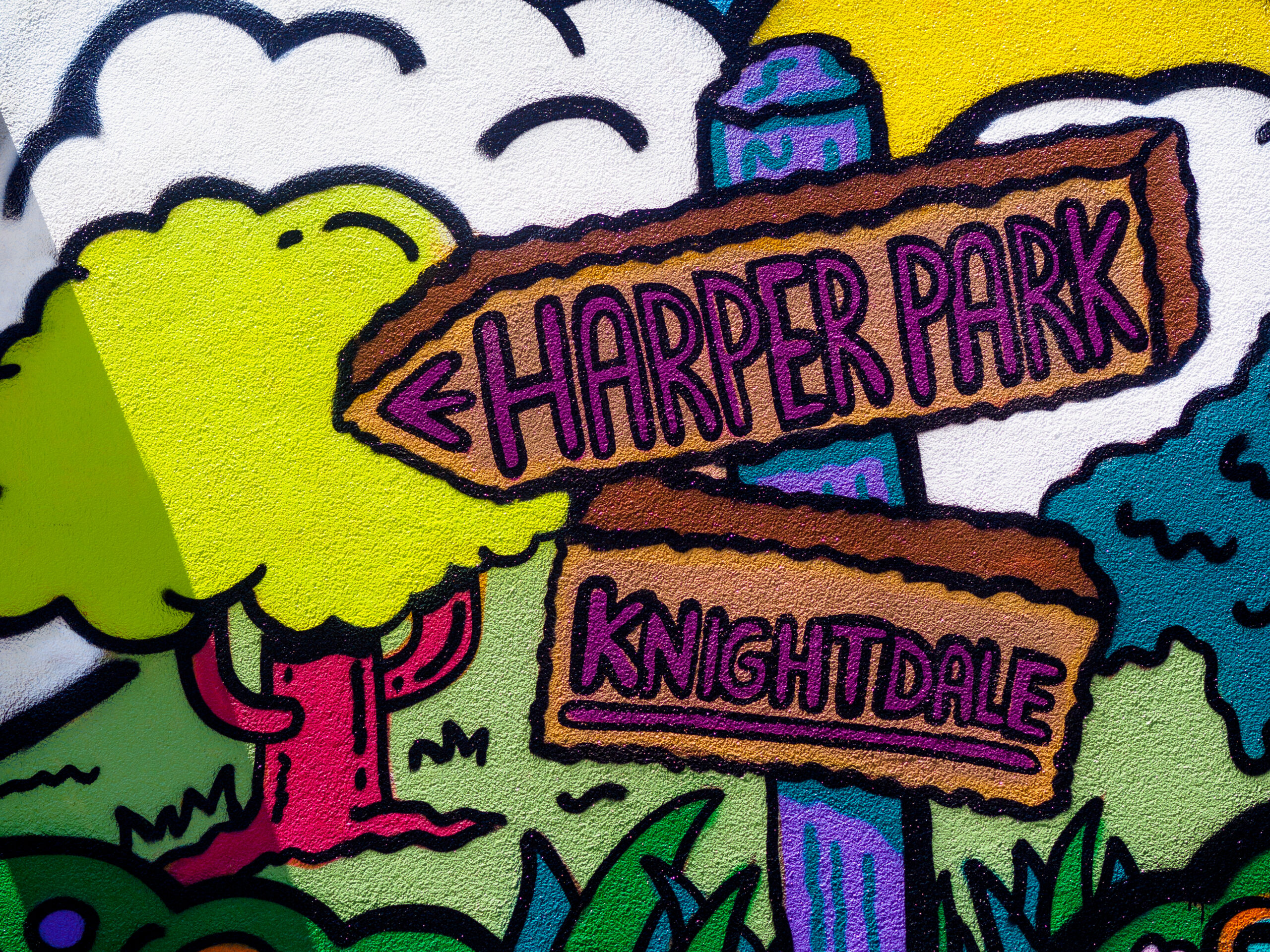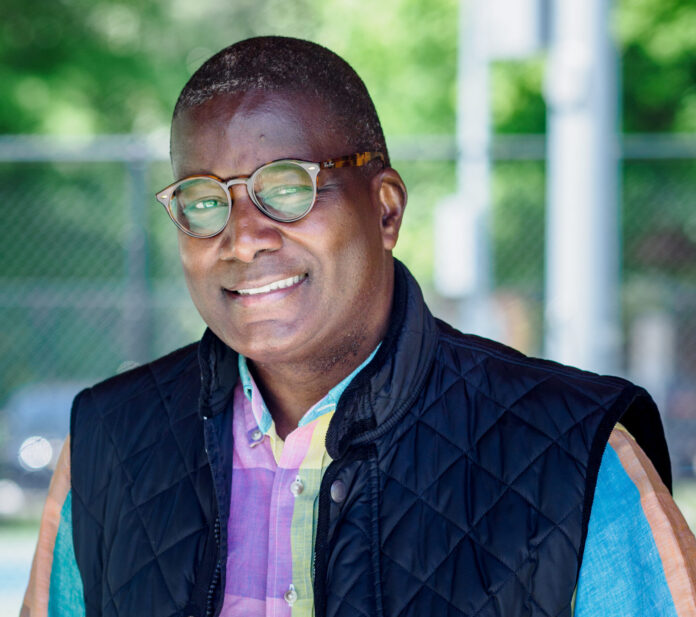Constructive relationships, his prior roles as a mayor and council member, the fast-growing sport of pickleball, and how it all relates
It wasn’t just the clean, spring weather that made the pickleball courts at Knightdale’s Harper Park so active on the day Southern City pulled up for a visit. The easy temperature and sunny vibrance commanded outdoor fun, yes, but there was something extra about this city-developed spot and its rhythm of racquet pops, sneaker swishes, friendly trash-talk, laughs, and handclaps. “This was like a ghost town,” said state Rep. James Roberson, who was looking over the busy courts and recalling the days before their development at what is one of Knightdale’s oldest parks. “I saw an opportunity to bring something online to possibly get family members and their kids off the sofas, out into the community, where they can spend quality time with each other but, more importantly, to focus on the health and wellness.” There was also a lack of activities for seniors in town, noted Rep. Roberson, formerly the mayor of Knightdale, while too noting the rapid ascension of pickleball among all ages in the United States. Clearly, the James Roberson Pickleball Courts at Harper Park—the facility was dedicated to him—have been a hot addition to town’s portfolio and new-resident draw. For the former local leader, it all involves a healthy environment of communication that he practices today with the communities in his district, to set partisanship aside and talk about what’s desired and achievable. While the goodtime pickleball games carried on, Rep. Roberson sat down with Southern City at a courtside shelter for some Q&A about his time in municipal government and what continues to motivate him as a state lawmaker today.
˘˘˘
Tell us more about what this place represents for Knightdale. How is this more than just a parks-and-rec project?
JR: When we brought this online, the community rallied behind it, started out with seniors coming out, and now, if you see what’s around you, you have folks from all various backgrounds, all ages. And the wonderful thing about this is being able to see family members spend quality time with each other, because so often you may have a parent that’s working two or three jobs. And the kids, when they get home from school, they sit in front of the video games and that’s where they park themselves. And then they begin to develop these bad habits of eating the wrong types of foods. Well, now, family members can come out here, they’re engaged, seniors can come out here, they’re engaged, and they’re focused on their health and wellness while having fun. This has been nothing but a goldmine… Now, fast-forward, eastern Wake County is deemed one of the healthiest communities.
 These pickleball courts are literally named after you. How does that experience—working with the community and seeing measurable change from the project you made together—help you as a state legislator today? Is there anything you can pull from this in your legislative day-to-day?
These pickleball courts are literally named after you. How does that experience—working with the community and seeing measurable change from the project you made together—help you as a state legislator today? Is there anything you can pull from this in your legislative day-to-day?
JR: Yes, and I have. I don’t think, when you leave local government, that you’re veering off too much. There’s that connection, that partnership, between local government, county government, and state government. So, this has afforded me the opportunity, now that I’m in state government, to continue to work on some of those objectives and goals that I started out with as an elected official on a local level. However, I get to elevate that by supporting my community and my district from a broader perspective. Which is great, because serving as the mayor of Knightdale or as a council member, we focused on things in our municipalities. Well, the obesity part … it wasn’t just a Knightdale issue, it was an eastern Wake County issue. Now, I’m able to extend those relationships and partnerships and continue to work on things like health and wellness, education. Those are the things that I’m passionate about. We have a community college that is being built right here in our backyard. It’s not just going to serve Wendell, but it’s going to serve parts of northeast Raleigh, Knightdale, Wendell, Zebulon, and Rolesville. And so in my experience as a retired administrator from the community college, I’ve seen the benefits of having this type of resource in your backyard and being able to connect the dots. But it’s all about collaboration and partnership. So, I’m able to take what I’ve learned from local government and expand on it, and now look at introducing legislation that could better support my community. There’s an education savings plan, which we have in the queue, it’s a bill that would support folks from underserved communities. And the way this bill is written, for those that are born in poverty, the state will invest in this savings account. By the time they’re 18 years old and they decide to go to community college or a four-year institution, their education is paid for. Now, some folks may ask the question: What if they decide not to go to college? Well, it’s a win-win situation, because all of that interest that has accrued over that time, that money goes back to the state. When you help realize these opportunities for these folks who do not otherwise have the opportunity to further their education, now they can become business owners, they can go from $8 an hour to $30–40 an hour, realize the American Dream, really of having a family, providing for their kids, purchasing goods and services, starting their own businesses, and now they’re giving back to the local economy. This is sitting right here in all of our backyards. It’s investing in people. It’s investing in education. And if you connect the dots, the communities come out ahead, the state comes out ahead, and now you have a robust community that is appealing to those who wish to migrate from up north, south, east, west. When they come and they see these things like the arts … they see this wonderful state surrounded by institutions of higher ed, and they see their state legislators supporting these efforts and being creative in supporting these efforts and supporting the citizens, it would be an appealing place for me to want to live, work, and play.

Was there a leadership example in your background? What brought you to public service?
JR: You know, I get that question a lot. And when I speak to young folk, I have to go back to my childhood. It started with my mom—I just lost my mom a few weeks ago. The wonderful thing is I know she’s smiling down on me, she’s proud of me. My mom has always been a big proponent of education. And so, coming from a single-parent home, she wanted to make sure that all of her kids had the resources, the necessary tools, the critical thinking skills to pursue their education and to do much better than what she did, much better than what my father did. And so, I remember being around five years old and getting up on early Saturday mornings, going out with her, getting folks registered to vote… And for us, we only had three networks back then—CBS, NBC, and ABC—and she was a big fan of Walter Cronkite. So, every four years, we had to sit in front of the television and watch the returns, and she would educate us on how important it is to vote. So, I think that’s where it started. But when I decided to go off to college, undergrad at Shaw University, I saw how involved Shaw University was with voting and commitment to community. And so those things just led to where I am now. And of course, my experience as an administrator at Wake Tech, being able to help realize opportunities for—well, for a lot of these kids, it’s their last opportunity. And I’m so thankful I was in an area that really contributed to student successes. So, I’m able to go out as a legislator now and talk about how we’ve been able to help folks realize the American Dream.
What’s different about serving as a legislator after serving in local government?
JR: I’m still learning because I’m in my second term. But I also understand, because of partisanship, it differs from serving on a local governing board. We were able to get things done, regardless of your party affiliation. And for me, since I’m in the supermajority, my party, I’ve been equipped with the resources to be able to work around things. Not everything needs to be accomplished with a bill or a law. There are things that you can do in your community. I’m very engaged with the schools… The challenges are from COVID, and with our teachers, they’re leaving by the droves. Same thing with our community colleges because the pay is low. I know as a state legislator we can do much better than that and we should. If you want this place to continue to be robust, to continue to be a destination for those who wish to come and retire here, folks look at a strong educational component, a strong workforce component, services and amenities, and a strong artist presence. North Carolina has those things. But it is sometimes difficult to have a conversation with others because they may have a myopic view. So, over the past two years, I’ve learned to work around things and create my own pathway, as I did when I was a council member and a mayor. And if the community believes in what you’re doing, they’re going to rally behind you and they’re going to help you find the resources to make things happen. So, I’m enjoying where I am. I wish there was more bipartisanship. It comes with the territory. But it makes me a stronger leader. It makes me work harder for my constituents. And I’m truly blessed to be able to serve them in this capacity. But I’m also able to think outside of the box to get some things done for my district.
 You’re clearly closely connected to your community. Do you keep a good flow of communication with local officials across your district?
You’re clearly closely connected to your community. Do you keep a good flow of communication with local officials across your district?
JR: I’ve groomed a lot of these folks that are serving on our local boards. I’ve helped a lot of folks get elected. I’m not bragging or anything like that. But I think if you’re going to be an effective leader, and you believe in your values, you want to identify folks—and I’m just one who believes in succession planning—so our current mayor is someone with whom I groomed. We have a few council members I’ve taken under my wings and groomed. Because those relationships are important. I need to make sure that I’m supporting my district in the right way. So, if there’s a controversial bill, I lean on the League of Municipalities. I have a very good rapport with them. So, I can pick up the phone and say, “Hey, what are the thoughts about this bill?” I can pick up the phone and call the mayor of Wendell, Zebulon, Knightdale, Rolesville. “What do you think about this bill?” Sometimes they get in touch with me: “James, this bill is coming down the pike. This is not a good bill. This is going to have a negative impact on us.” I’m able to go to my caucus and say, “Hey, I’ve talked to some of my leaders in municipal government. They’re of the opinion this is a bad bill and here’s the reason why.” And we can either take a caucus stand or encourage folks to vote no on the bill. So those relationships are very important. And I have a good relationship with every mayor in my district… And even mayors outside of my district. I served as the mayor for two terms. I had these relationships. And with our county commissioners… So, for me, I’m in a very good place of being able to work on behalf of my constituents. And on behalf of North Carolina. When I took the oath, it said I’m representing all of North Carolina… There’s nothing like a valuable education, and your education doesn’t just stop once you get out of high school, college, or grad school. I learn something every day. I learn from these people out here. These folks come from myriad backgrounds and to be able to have opportunities to learn about their backgrounds—some former nurses, doctors, lawyers. They give me advice and I listen intently because you never know. Some bill might come up and you say, “Oh, I remember having a conversation with Judy, she’s a nurse, let me pick up the phone and get some feedback from her.” It’s a win-win situation.
What do you think is the effect when there isn’t that communication between the local level and the state legislature?
JR: I think you’re in a failed community. I think the community is doomed to fail. Then all of a sudden you see relaxed policies that could have a negative impact on a community, and it no longer becomes a desirable place to live. And I can tell you, as local government, when there was an issue with a developer, we would hear from the citizens… You have to look at the long-term impacts and effects… Those are things that I have dealt with as an elected official, and I’ve been able to pick up the phone and seek advice from my representatives… “We have this homeowner who is having this issue. How do we get this person some help?” Those types of relationships are important. If it’s not taking place, I think you’re setting the community up to fail, and you won’t see the community advancing like other communities.
Elected office, maintaining healthy communication, pursuing issues to resolve—it can be a lot of work. How do you unplug and enjoy yourself?
JR: Pickleball, tennis. I’ve been playing tennis for 48 years. I still play tennis. It’s easy for me to get out here and play pickleball. I get out every morning around 6:15. And before going downtown, I get out and there’s a gentleman, he and I have been playing probably for the past four or five years. We get up religiously, first thing in the morning. That helps to decompress me. And a lot of folks, when I go downtown, I see folks, they seem like they’re stressed out—I had this rabbi come up to me and say, “You always seem positive.” Well, I’m truly blessed. I’ve worked at the largest community college in the state of North Carolina. I’ve worked at what has been deemed twice the fastest-growing municipality in the state of North Carolina. Where there was nothing but vegetation, you see this urban-like community, mixed development taking place. And I’ve been a part of that. And so now I’m in state government, helping to realize opportunities for my constituents and other North Carolinians. That gives me that drive, that push. If I did not, or I felt like I was just burned out from this, I promised my wife a long time ago that I’d step away… But my wife says that as long as I’m enjoying this—which I am—I’m not saying it doesn’t get frustrating—however, this is my outlet. I’m able to come out here, laugh, do some trashing talking—because I think I’m the Michael Jordan of pickleball—and fellowship. I mean, look at these people (playing on the courts)! They’re just having a ball! This is what completes me. And, more importantly, I have conversations with others. If I feel like I’m getting stressed out, I have conversations with my wife, I have conversations with my friends… This is what helps, and this is what keeps me going. It is my hope and prayer that we can continue, through all the stuff that’s going on, that we will find a way to work with one another on a bipartisan basis for our constituents. It’s not about us. This position is not about me.














